Organizational Change and Development in Management Systems - Final Project Worksheet
Added on 2023-05-30
47 Pages10736 Words284 Views

DIRECTIONS ON USING THE WORKSHEET
The Worksheet is designed for learners to use as a running journal cataloguing their
understanding of the research. A separate workbook is used to catalogue understanding of the
textbook to be used as an additional resource for the final project. Each Section contains
reflection questions related to the assigned reading, which the learner must complete.
The course annotated bibliography assignments may be found after Units 2, 4, and 6 (in this
Worksheet). Further, the completed Worksheet is due during the final week of the course.
Revising Your Work
Please revise your writing as you complete the Worksheet. You should:
● Ensure your writing remains concise.
● Make sure that what you said is worth saying, what you wanted to say, and whether a
reader will understand what you are saying.
● Ask yourself whether your writing is relevant to the prompt or question.
Make sure you create the best Worksheet possible, ensure its readability, and transform it into a
tool for future classes and examinations.
Note: In some instances the articles may no longer be available. In that case, locate an article in
the LIRN that appears to address a similar topic and substitute that article. Make a note in your
paper to your instructor to let them know which article you changed.
1
Final Project Worksheet:
Organizational Change and
Development
in Management Systems
MGT
616
The Worksheet is designed for learners to use as a running journal cataloguing their
understanding of the research. A separate workbook is used to catalogue understanding of the
textbook to be used as an additional resource for the final project. Each Section contains
reflection questions related to the assigned reading, which the learner must complete.
The course annotated bibliography assignments may be found after Units 2, 4, and 6 (in this
Worksheet). Further, the completed Worksheet is due during the final week of the course.
Revising Your Work
Please revise your writing as you complete the Worksheet. You should:
● Ensure your writing remains concise.
● Make sure that what you said is worth saying, what you wanted to say, and whether a
reader will understand what you are saying.
● Ask yourself whether your writing is relevant to the prompt or question.
Make sure you create the best Worksheet possible, ensure its readability, and transform it into a
tool for future classes and examinations.
Note: In some instances the articles may no longer be available. In that case, locate an article in
the LIRN that appears to address a similar topic and substitute that article. Make a note in your
paper to your instructor to let them know which article you changed.
1
Final Project Worksheet:
Organizational Change and
Development
in Management Systems
MGT
616
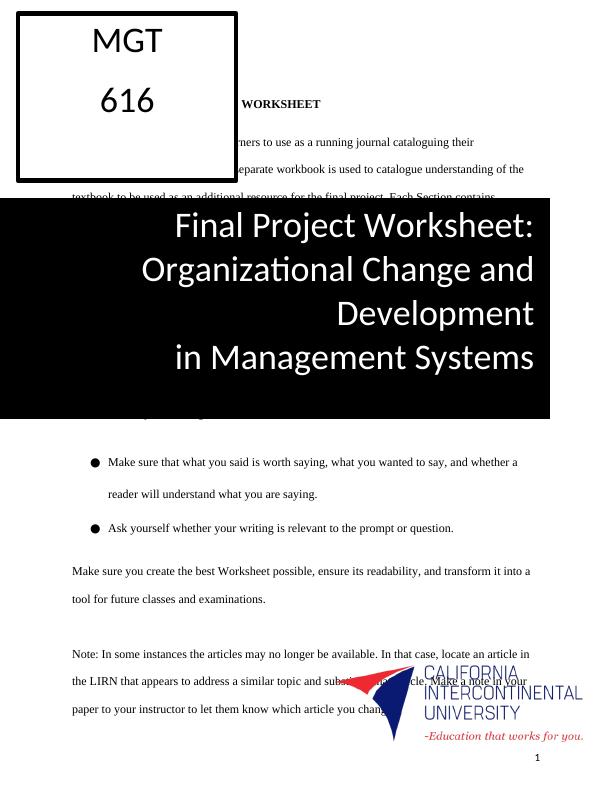
Important Due Dates and the Purpose of the Assignment
This assignment requires two separate submissions:
End of Week 6. Submit the Final Project Worksheet.
End of Week 6. Submit the completed essay with annotated references.
The purpose of this assignment is to analyze three journal articles every two weeks so as to
address the writing prompt. Further, you will gain experience in breaking apart journal articles
into their components, uncovering the nature of discourse oft encountered in articles, and
figuring how both shape the development of the topic covered by the articles. It is critical to
remain mindful that you will analyze three articles participating in a much larger academic
conversation!
The Analysis Guide
Your goal as an analytical essay writer is to break down the selected journal articles into
components useful for addressing the writing prompt. The guiding principle for this assignment
is to adhere to the prompt. You will be assessed on how well you communicate an analysis of
the articles to a receptive audience wanting to understand how the components connect and
address the writing prompt.
Remember that only essays adhering to the prompt may obtain high marks.
Prepare Yourself as a Writer
2
This assignment requires two separate submissions:
End of Week 6. Submit the Final Project Worksheet.
End of Week 6. Submit the completed essay with annotated references.
The purpose of this assignment is to analyze three journal articles every two weeks so as to
address the writing prompt. Further, you will gain experience in breaking apart journal articles
into their components, uncovering the nature of discourse oft encountered in articles, and
figuring how both shape the development of the topic covered by the articles. It is critical to
remain mindful that you will analyze three articles participating in a much larger academic
conversation!
The Analysis Guide
Your goal as an analytical essay writer is to break down the selected journal articles into
components useful for addressing the writing prompt. The guiding principle for this assignment
is to adhere to the prompt. You will be assessed on how well you communicate an analysis of
the articles to a receptive audience wanting to understand how the components connect and
address the writing prompt.
Remember that only essays adhering to the prompt may obtain high marks.
Prepare Yourself as a Writer
2
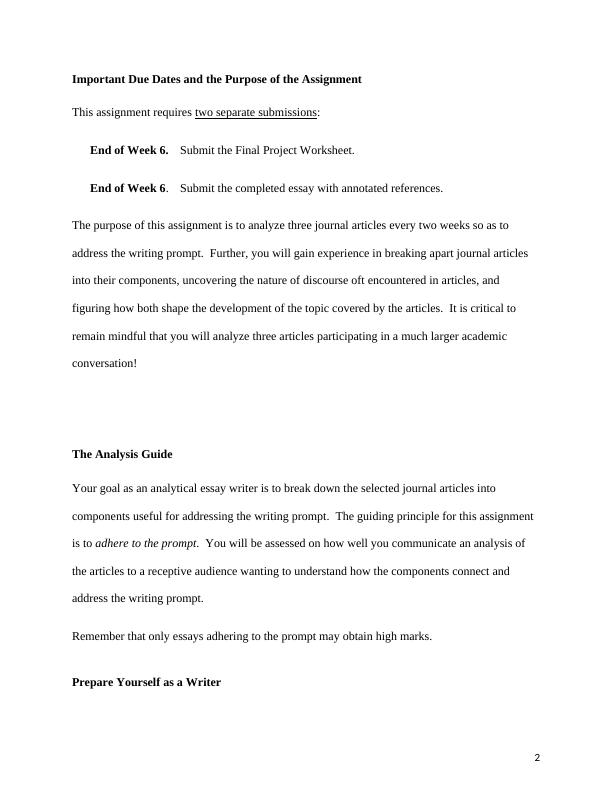
As an aspiring analyst, you should engage a process allowing you to complete the Analysis
Worksheet while preparing to draft the analytical essay. Thus, before dashing into the
assignment, you should:
● Break down the writing prompt into a checklist of goals necessary for successfully
completing the assignment.
● Find your weak spot. (A little more on this later!)
● Review, process, and submit the Analysis Worksheet on time as to obtain feedback.
● Brainstorm and outline the analytical essay using the feedback from the graded
Analysis Worksheet and your reading notes.
● Draft and revise the analytical essay before submitting it.
Remember, planning is a key to success. Make sure to have a schedule and do your best to stick
with it!
Find Your Weak Spots
Jung once commented, “Until you make the unconscious conscious, it will direct your life, and
you will call it fate.” His words ring true aspiring writer unaware of and guided by their
weaknesses. Thus, it is important to uncover your weak spots and transform them into strengths
benefiting your writing.
3
Worksheet while preparing to draft the analytical essay. Thus, before dashing into the
assignment, you should:
● Break down the writing prompt into a checklist of goals necessary for successfully
completing the assignment.
● Find your weak spot. (A little more on this later!)
● Review, process, and submit the Analysis Worksheet on time as to obtain feedback.
● Brainstorm and outline the analytical essay using the feedback from the graded
Analysis Worksheet and your reading notes.
● Draft and revise the analytical essay before submitting it.
Remember, planning is a key to success. Make sure to have a schedule and do your best to stick
with it!
Find Your Weak Spots
Jung once commented, “Until you make the unconscious conscious, it will direct your life, and
you will call it fate.” His words ring true aspiring writer unaware of and guided by their
weaknesses. Thus, it is important to uncover your weak spots and transform them into strengths
benefiting your writing.
3
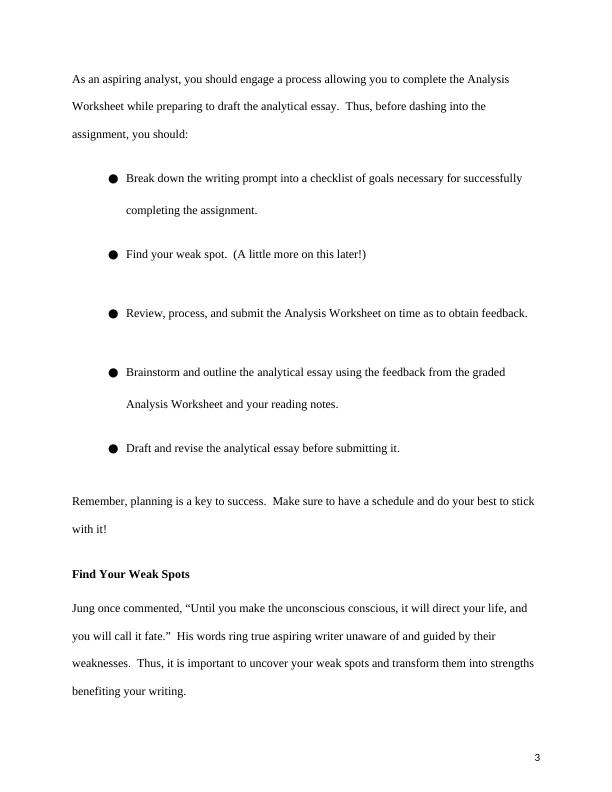
Transforming weakness into strength is an introspective effort requiring honesty while reading
an article. For example, if you find yourself:
● ...encountering terms and phrases you do not know, then it would be smart to look
them up.
● ...unable able to articulate the purpose of an article after reading it, then it would be a
good idea to Tackle the Analysis. (More on this in a moment.)
● ...struggling to recall noteworthy ideas appearing within the article, then it would be
handy to make margin notes, reading notes, and highlights of key concepts and terms.
● ...unable to formulate inferences after reading, then ask whether you read carefully
enough!
The most significant action leading to the transformation of weakness to strength is being honest
with yourself when facing a challenge. Being honest with yourself may result in a feeling of
being overwhelmed. However, that is a good sign because you are acknowledging weaknesses
and working on transforming them into knowledge supporting your role as a successful analyst.
Take a few moments and scan one of the articles as to find your weak spots. Then, immediately
afterward, work on resolving them into useful knowledge!
Tackle the Analysis
The analysis is simply not a set of steps to follow—it is an experience in which you will develop
a strategy suited for writing analytical essays. If you are new to analysis, then you should start
by Working the Prompt:
4
an article. For example, if you find yourself:
● ...encountering terms and phrases you do not know, then it would be smart to look
them up.
● ...unable able to articulate the purpose of an article after reading it, then it would be a
good idea to Tackle the Analysis. (More on this in a moment.)
● ...struggling to recall noteworthy ideas appearing within the article, then it would be
handy to make margin notes, reading notes, and highlights of key concepts and terms.
● ...unable to formulate inferences after reading, then ask whether you read carefully
enough!
The most significant action leading to the transformation of weakness to strength is being honest
with yourself when facing a challenge. Being honest with yourself may result in a feeling of
being overwhelmed. However, that is a good sign because you are acknowledging weaknesses
and working on transforming them into knowledge supporting your role as a successful analyst.
Take a few moments and scan one of the articles as to find your weak spots. Then, immediately
afterward, work on resolving them into useful knowledge!
Tackle the Analysis
The analysis is simply not a set of steps to follow—it is an experience in which you will develop
a strategy suited for writing analytical essays. If you are new to analysis, then you should start
by Working the Prompt:
4
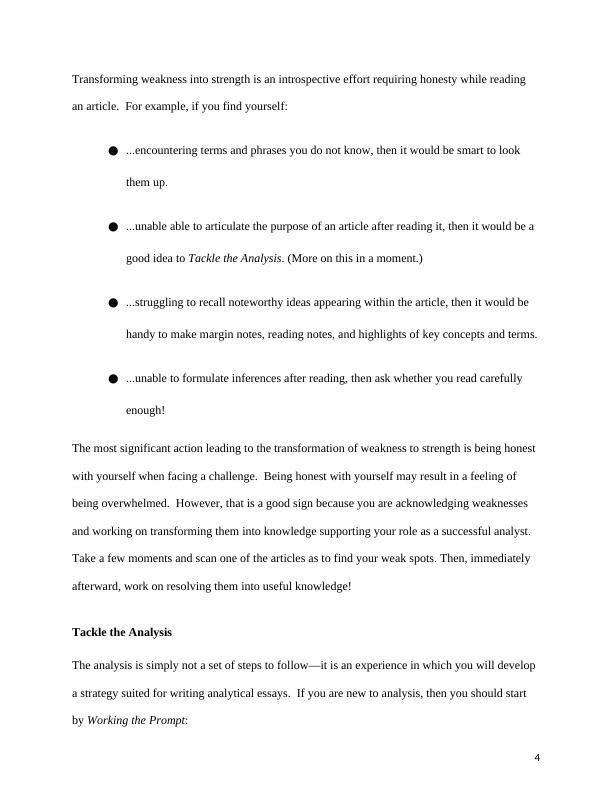
● Invest 5-10 minutes into carefully reading the prompt. Make sure you can articulate
the goals required to address the prompt. If you have questions, be sure to ask for
help!
● Highlight essential terms and elements appearing within the prompt. It is important
to identify and understand the essence of the prompt and what it offers your analysis
efforts. Essential elements often include things such as: (a) titles; (b) publication
dates; (c) disciplines; and (d) the intentions of prompt.
The above activities should help you grasp the goals of your analytical essay. Now it is time to
sit down and work through the following activities for each article:
● Read the abstract and highlight the: (a) purpose; (b) method; and (c) findings of the
study.
● Scan the article as to get a gist of the study and skip what you do not immediately
understand.
● Reread the article and use margin notes and highlights to help you mark important
information. Make sure you understand the elements you ignored while scanning the
article.
● Confirm that the highlights and margin notes help you see the content, utility, and
value of the article.
5
the goals required to address the prompt. If you have questions, be sure to ask for
help!
● Highlight essential terms and elements appearing within the prompt. It is important
to identify and understand the essence of the prompt and what it offers your analysis
efforts. Essential elements often include things such as: (a) titles; (b) publication
dates; (c) disciplines; and (d) the intentions of prompt.
The above activities should help you grasp the goals of your analytical essay. Now it is time to
sit down and work through the following activities for each article:
● Read the abstract and highlight the: (a) purpose; (b) method; and (c) findings of the
study.
● Scan the article as to get a gist of the study and skip what you do not immediately
understand.
● Reread the article and use margin notes and highlights to help you mark important
information. Make sure you understand the elements you ignored while scanning the
article.
● Confirm that the highlights and margin notes help you see the content, utility, and
value of the article.
5
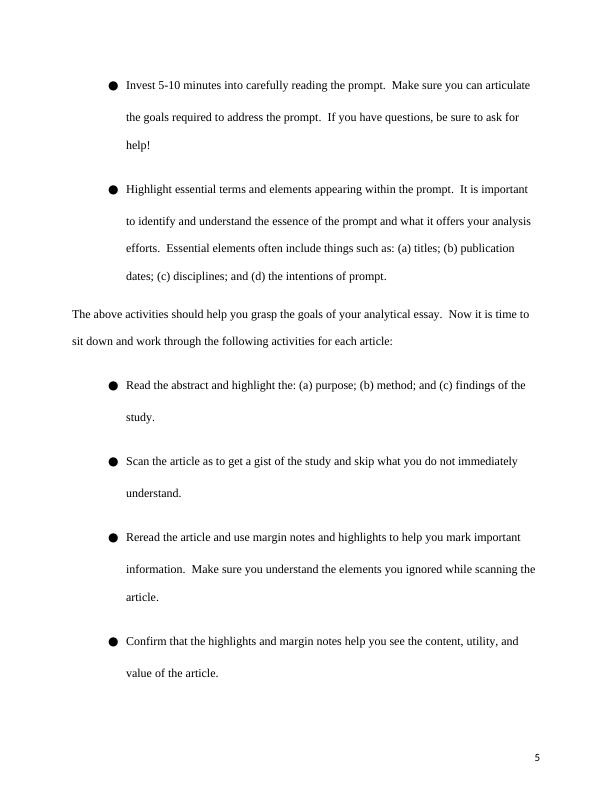
● Cluster highlighted segments and margins into groups sharing a common theme or
idea. For example, if you have a subset of margin notes all sharing a theme such as
the struggles faced by entrepreneurs in deregulated markets, then you may wish to
lump them into a single theme.
● Draw a picture relating themes, highlighted elements, and margin notes as to show
potential relationships.
Highlights and margin notes are important because they serve as reminders and help organize
your reading notes into themes. In turn, the themes may help organize your analytical essay and
crystallize your understanding of the articles.
UNITS ONE AND TWO ASSIGNMENT
The assignment is to respond to the questions regarding three selected peer-reviewed journal
articles.
The Writing Prompt
Buonocore (2004), Sutherland (2013), and Burnes (2004) offered diverging insights into the
nature and utilization of Lewin’s Change Management Theory. Although Buonocore,
Sutherland, and Burnes subscribe to the utility of Lewin’s theory for promoting organizational
change, each express support and concerns regarding Lewin’s theory. Your goal is to analyze,
differentiate, and compare the components (or themes) shaping Buonocore’s, Sutherland’s, and
Burnes’ perspectives regarding the utility of Lewin’s theory.
The articles are:
6
idea. For example, if you have a subset of margin notes all sharing a theme such as
the struggles faced by entrepreneurs in deregulated markets, then you may wish to
lump them into a single theme.
● Draw a picture relating themes, highlighted elements, and margin notes as to show
potential relationships.
Highlights and margin notes are important because they serve as reminders and help organize
your reading notes into themes. In turn, the themes may help organize your analytical essay and
crystallize your understanding of the articles.
UNITS ONE AND TWO ASSIGNMENT
The assignment is to respond to the questions regarding three selected peer-reviewed journal
articles.
The Writing Prompt
Buonocore (2004), Sutherland (2013), and Burnes (2004) offered diverging insights into the
nature and utilization of Lewin’s Change Management Theory. Although Buonocore,
Sutherland, and Burnes subscribe to the utility of Lewin’s theory for promoting organizational
change, each express support and concerns regarding Lewin’s theory. Your goal is to analyze,
differentiate, and compare the components (or themes) shaping Buonocore’s, Sutherland’s, and
Burnes’ perspectives regarding the utility of Lewin’s theory.
The articles are:
6
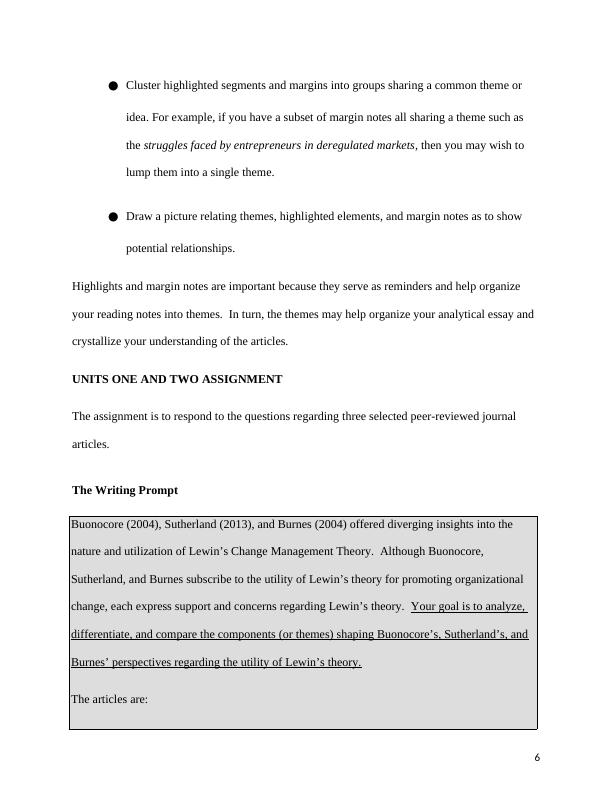
● Buonocore, D. (2004). Leadership in action: Creating a Change in Practice. AACN
Clinical Issues, 15(2), 170-181. Retrieved from https://goo.gl/qdX97I
● Sutherland, K. (2013). Applying Lewin’s Change Management Theory to the
Implementation of Bar-Coded Medication Administration. Retrieved from
https://goo.gl/rlpNSp
● Burnes, B. (2004). Kurt Lewin and the Planned Approach to Change: A Re-appraisal.
Retrieved from https://goo.gl/LEqULt
Important Due Dates and the Purpose of the Assignment
DUE DATE: This entire Worksheet is due in Unit 6. You will use the research you conduct
to complete the Final Project that is also due in Unit 6.
The purpose of this assignment is to analyze three journal articles. You will gain experience in
breaking apart journal articles into their components, uncovering the nature of discourse oft
encountered in articles, and figuring how both shape the development of the topic covered by the
articles. It is critical to remain mindful that you will analyze three articles participating in a
much larger academic conversation!
First Article
Question 1. What is the APA formatted reference for the article?
Buonocore, D. (2004). Leadership in action: Creating a Change in Practice. AACN Clinical
Issues, 15(2), 170-181.
7
Clinical Issues, 15(2), 170-181. Retrieved from https://goo.gl/qdX97I
● Sutherland, K. (2013). Applying Lewin’s Change Management Theory to the
Implementation of Bar-Coded Medication Administration. Retrieved from
https://goo.gl/rlpNSp
● Burnes, B. (2004). Kurt Lewin and the Planned Approach to Change: A Re-appraisal.
Retrieved from https://goo.gl/LEqULt
Important Due Dates and the Purpose of the Assignment
DUE DATE: This entire Worksheet is due in Unit 6. You will use the research you conduct
to complete the Final Project that is also due in Unit 6.
The purpose of this assignment is to analyze three journal articles. You will gain experience in
breaking apart journal articles into their components, uncovering the nature of discourse oft
encountered in articles, and figuring how both shape the development of the topic covered by the
articles. It is critical to remain mindful that you will analyze three articles participating in a
much larger academic conversation!
First Article
Question 1. What is the APA formatted reference for the article?
Buonocore, D. (2004). Leadership in action: Creating a Change in Practice. AACN Clinical
Issues, 15(2), 170-181.
7
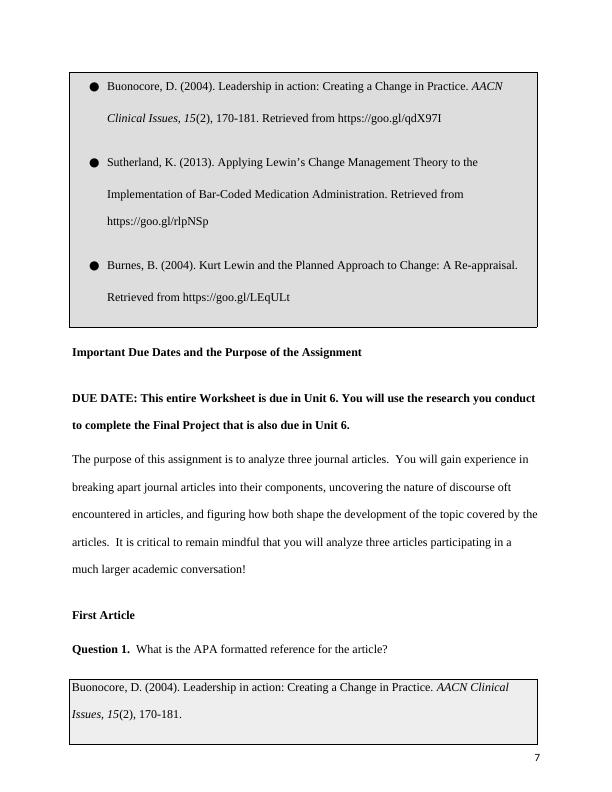
End of preview
Want to access all the pages? Upload your documents or become a member.
Related Documents
Organizational Change and Development in Management Systemslg...
|28
|9305
|29
Satisfactory APA Style Annotations | Assignmentlg...
|11
|3495
|470
Worksheet & Peer Reviewlg...
|4
|1094
|23
English 201 Reflective Response Examplelg...
|4
|2697
|169
Research Assignment on Psycho Film: Guidelines and Citationlg...
|2
|969
|473
Online Privacy: Issues, Concerns, and Measures to Ensure Protectionlg...
|2
|678
|110
